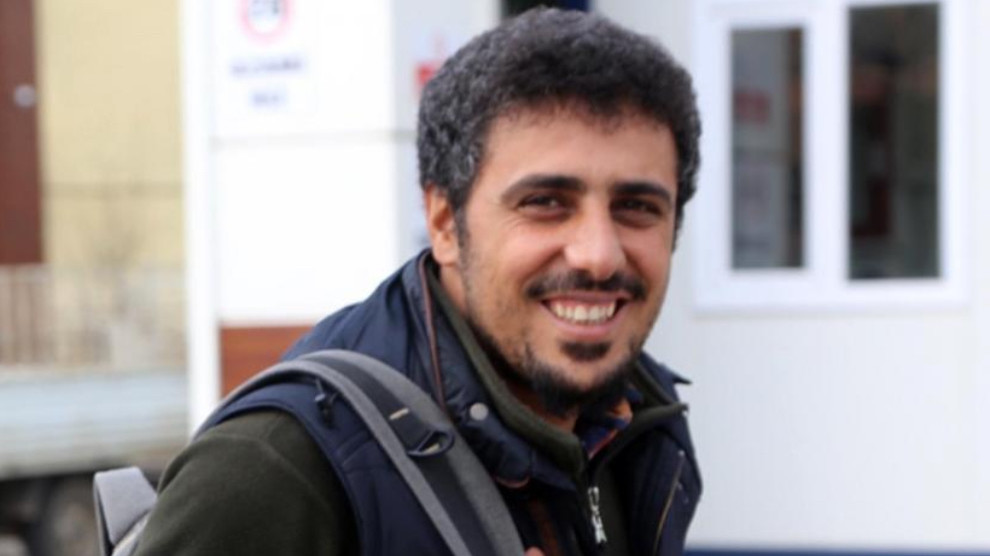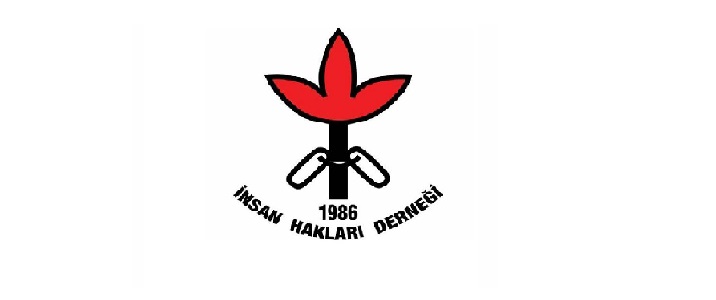
Recently released from Patnos Prison in eastern Turkey, journalist Aziz Oruç defines the outside world as “a partial freedom” and adds: “We need to foster journalists’ solidarity regardless of who works for which newspaper.”
“I am not very happy that I have been released. Because prisons have been packed with thousands of people unlawfully and unjustly serving time behind bars. When I was in prison, prisoners said to me, ‘You are a journalist, your voice has been heard, no one hears our voice or makes it heard.’ If I utter a sentence for myself, I will utter five for them.”
The responsibility of making the voices of prisoners heard is on the shoulders of journalist Aziz Oruç, who has recently been released from Patnos Prison in Turkey’s Kurdish-majority eastern province of Ağrı.
Aziz Oruç was a reporter for the Dicle News Agency (DİHA), which was closed by a Statutory Decree after the coup attempt in 2016. Due to the lawsuits filed against him in Turkey, he had been living in neighboring Iraq for almost three years, away from his wife and two children.
He first went from Iraq to Armenia to go to Europe, but he was taken into custody at the border gate in Armenia, where the police handed him over to the soldiers of Iran. The soldiers forced Oruç to cross the border into Turkey on December 11, 2019.
It was also when the media manipulation began. He was taken into custody. The pro-government media published the images of journalist Aziz Oruç, attaching the note, “The terrorist has been caught.”
Leading his life with his news reports, his social media accounts opened in his own name and his posts, so with his open identity, Oruç was declared by this media to be a “so-called journalist” and a “terrorist.”
On December 18, the court ruled for his arrest on charges of “membership of an organization” and “propagandizing for a terrorist organization.” He was then sent to Patnos Prison in Ağrı province.
His wife Hülya Oruç and fellow journalists, for 11 months, said over and over again that Oruç was a journalist; however, he was not released at his first hearing. On November 11, Oruç was finally released at his third hearing.
CLICK – Journalist Aziz Oruç released
Aziz Oruç has answered the questions of bianet.
‘A partial freedom’
After 11 months, you have been outside prison. How do you feel?
I feel good. Leaving prison after 11 months is indeed a partial freedom. Because there is no full freedom outside. I am happy that I have reunited with my wife, my children and my family.
However, I am equally sad and bitter. I took a step outside prison, but there are thousands of prisoners in that prison. Several of them are behind bars though they did not commit any crime; journalists, academics, writers, politicians… There is such misery. They are well-known people.
They are people whose names we hear everyday. There are also thousands of people whose names are not heard, whose names are not even mentioned in public. I have a great responsibility towards these people. That I have been released does not mean that everything is a rose garden now.
‘No one hears us’
What did you witness in prison?
I have been constantly saying this. There is a great expectation from the prison. In prison, prisoners were telling me, “They have published you, they have heard your voice, but no one hears us for years. You write about us.” If I utter one sentence for myself, I will utter five for them.
I witnessed rights violations in person. Especially in the recent period… The pandemic, which has shaken the world, has affected prisons more negatively. The worse the pandemic got, the fewer the measures became. There are no pandemic measures in prison. So this is a situation of two exact opposites: The worse the pandemic got, the fewer the measures became.
For instance?
No hot water was provided. I have recently said this as well, I do not have any problems with anyone, I do not have any intention to target or smear people. I wrote to the Ministry of Justice and to the prison administration. We wrote hundreds of petitions to everyone; we wrote about the food, about the letters, about the newspapers such as “BirGün”, “Cumhuriyet” and “Evrensel” that were not given. With the onset of the pandemic, they started not giving the pro-government dailies as well.
When we sent a letter, it almost took a month to reach its destination. Or when a letter was sent to us, it did not come. There is a saying for this: “Letters come on the back of a tortoise in prison.” This was exactly what we experienced in prison. Moreover, no hot water was provided, our drinking water was terrible. We were having a bath with cold water.
Patnos is a very cold place. It will start snowing in 10 days and it will not melt until mid-April. I could live through the winter thanks to the long underwear, pyjamas, trousers, pullovers and coats I had worn.
‘Going to hospital means torture’
Which right violation was the most striking for you?
Two-three ill prisoners have lost their lives over the past three months. There are some prisoners suffering from serious stomach disorders.
Prisoners are taken from prison to hospital in such bad conditions that people started not preferring to go to hospital. Because you go there in handcuffs, you are not treated and you stay in solitary confinement for 20 days after you return. No one prefers this. As they are not treated when they go to hospital, people do not want to go through this torture.
For instance, a prisoner named Ali Boçnak lost his life exactly because of this. He did not go to hospital, he preferred death. He could not access his right to healthcare.
What does it mean to access the right to healthcare? If you go to a hospital in a shuttle without handcuffs in proper conditions and if you are treated and given your medication, then it means that you have accessed your right to health. They neither treat ill prisoners, nor do they give them their medicine.
Was there solidarity for you?
Yes, I would like to thank all my fellow journalists. We need to foster the solidarity even more. We have to do this regardless of who works for which newspaper.
I was really happy that Müyesser Yıldız was released. “I don’t know what she writes or where she works. A journalist has been released,” I said and felt happy about it. I also mentioned it in my own case that Barış Terkoğlu and Barış Pehlivan had been released.
You were targeted in some media…
They called me a “terrorist with blood on his hands.” Those who called us terrorists in 2011 are in prison today; so, it is not certain what will happen tomorrow. When we talk about law, we talk about law and justice for everyone. For all journalists…
Different journalists used to target us in the past, different journalists do it now. What can I say? I will keep doing journalism and defending journalism.
‘I wrote a book named “A Road Story”‘
What did you do in prison?
You are a journalist, no matter where you are. I wrote a book about what I went through in prison. The book is titled “A Road Story”. I can say that it is more of a draft.
When they left me in Iran, they said to me, ‘If you follow this path, there are mines on your way; if you follow that path, they will kill you.” There are such details in the book. They abandoned me to death on the Iran border. I wrote about those things.
I need solidarity and support for this book. Moreover, I penned articles about the situation there, they were published in daily Yeni Yaşam. I collected documents about some news, but the prison administration seized them.
Is there anything you would like to add?
I want to keep practicing my profession so that I can make the voices of thousands of unlawfully and unjustly jailed people heard.
But I also think that we need to turn this solidarity into a more collective one and speak up more loudly. A divided struggle for journalism would be weaker; only when a struggle is waged for all journalists regardless of who they are and what they write, this struggle will make all journalists much stronger. (EMK/SD – BIA)

